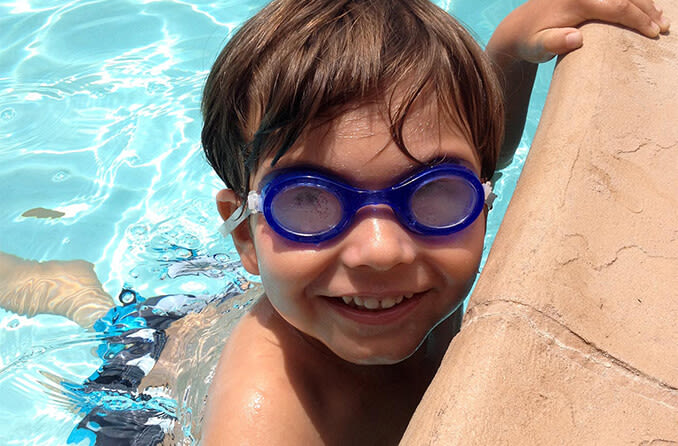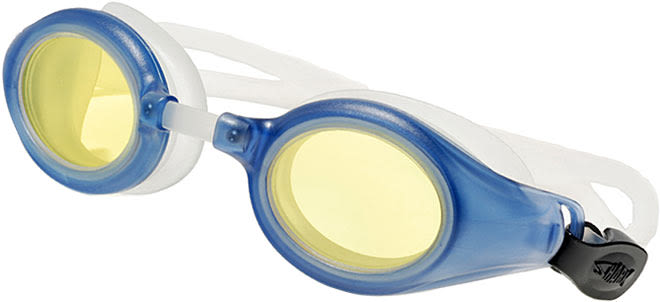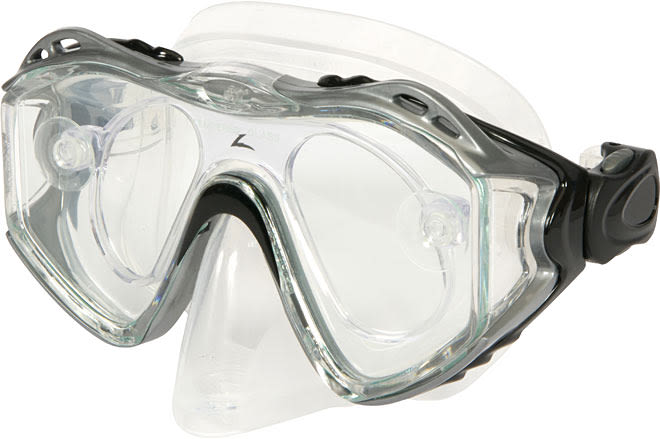A buyer's guide to swim goggles and dive masks

Scuba diving masks and swim goggles can sharpen your vision and keep you and your eyes safer while you swim, snorkel or explore underwater.
If you normally wear eyeglasses or contact lenses, prescription swimming goggles and dive masks will increase your enjoyment underwater and help you avoid possible hazards.
Why Dive Masks And Swim Goggles Are Needed
Light behaves differently in water than in air, distorting what you see. Particularly when you are swimming or diving, objects appear larger and closer than they actually are. This can hamper your hand-eye coordination.

Wearing prescription swim goggles means you don't have to swim with blurry vision and you don't have to risk losing your contacts or getting eye infections from waterborne microorganisms. Shown here are Shark swim goggles by Liberty Sport.
Swim goggles and diving masks work by providing a pocket of air in front of you that enables light rays to travel to and through your eyes in a more precisely focused way.
Because water refracts (bends) light differently than air, your vision will be blurred and out of focus if your eyes are in direct contact with water — even if you normally see perfectly well.
In fact, in such conditions, a person who has 20/20 visual acuity on land will be legally blind underwater.
If you wear prescription eyewear because you are nearsighted, are farsighted or have astigmatism, you also will need corrective lenses to see clearly underwater.
But your prescription may need to be changed, because the distance between the lens of your goggles or diving mask and your eyes typically is different from the distance between your eyeglasses lenses and your eyes.
(This also is one of the reasons your contact lens prescription is different from your eyeglass prescription if you have moderate or high myopia.) An eye care professional specializing in sports eyewear can adjust your prescription for underwater use.
Your choice of a diving mask or goggles will depend on your activities and specific needs.
SEE RELATED: How safe is it to open your eyes underwater?
Tips For Buying Scuba Diving And Snorkeling Masks
Diving masks, which are designed for scuba diving or snorkeling, tend to be large and rectangular, rising high and across the forehead and dipping down low, almost to the bottom of the nose. Most diving masks are made of soft silicone, which is hypoallergenic and resists deterioration. Most have a double-flanged face seal to keep the mask watertight.

The Leader xRx Custom Rx-able dive mask with a tempered glass lens is suitable for diving & snorkeling, and it can be worn with or without the Rx adapter. Special features include side windows for a 180-degree view and a hypo-face skirt with purge valve.
Prescription diving masks work in one of two ways:
The entire lens area is a prescription lens, or
Prescription lenses are inserted separately between the mask face shield and your eyes.
If the dive mask comes with prescription lenses, it can be made to your specific measurements and correction. Also, masks are available pre-made with prescription lenses that have an equal correction for nearsightedness or farsightedness for both eyes.
Although these pre-made lenses don't correct astigmatism, most people who need corrective lenses can see well enough with them in most underwater situations. But if you have a lot of astigmatism, this solution may not be for you.
Alternatively, some diving masks have a fixed lens area in the front that allows an insert containing custom-made prescription lenses to slide in behind it.
Prescription lens inserts are especially handy for contact lens wearers, because the same diving mask can be used depending on your choice of vision correction. If you wear your contact lenses for a dive, you don't need to use the prescription insert. If you prefer not to wear your contacts, you can slide in the insert for a clear underwater experience.
Keep in mind that not all contact lenses are suitable for diving, and swimming or diving while wearing contacts can cause problems.
Gas permeable lenses (GP lenses) can "dig in" to the eyes below certain depths because of pressure, and soft contact lenses can collect waterborne organisms, become contaminated and cause eye infections. This can happen in swimming pools, lakes, rivers and the ocean.
SEE RELATED: Swimmer's eye
Goggle/Mask Tips
How To Prevent Fogging And Leaking
Fogging and leaking are common and annoying problems with both swimming goggles and diving masks.
To avoid leakage, always try on goggles or masks before buying to make sure they fit snugly and comfortably.
With masks, remember that tighter is not always better. Masks that are too tight might pull away from the face and release the suction.
To keep lenses from fogging, try these tips:
Use gentle soap such as baby shampoo to clean lenses, particularly on the day you plan to swim or dive.
Consider buying lenses with anti-fog coatings.
Anti-fog sprays, drops and gels often work well, too. Always read the label before buying, because some of these products are meant for snorkeling and dive masks only — not swim goggles.
Store goggles and masks in protective cases to prevent dirt and scum from building up on lenses. This will also prevent scratching.
Placing your mask or goggles in the water just before wearing them also may help prevent fogging. — M.H.
READ NEXT: What are Smart Swim Goggles and What Do They Do?
Tips For Buying Swim Goggles
Swimming goggles are similar to diving masks, but they are much smaller and usually are round or oval in shape. They also fit closer to the eyes than dive masks.
Goggles protect your eyes from the water and are sleek and unobtrusive so they won't interfere with your speed and motion. In prescription goggles, corrective lenses are integrated into the watertight silicone frame.
Generally, swim goggles are used in pools, a setting where prefabricated prescription goggles provide adequate vision. If necessary, however, custom lenses — including lenses that correct astigmatism — can be made for nearly any model of goggles.
Lenses for diving masks and swim goggles are available in a variety of materials, including glass, acrylic, plastic and polycarbonate.
If you swim competitively, you might consider buying two sets of swim goggles — one pair that is rounder and less snug for practice and the other that fits tightly but somewhat uncomfortably in the eye socket to achieve the best aerodynamics for racing.
Ask your eyewear provider for assistance in adapting your eyeglass prescription for use in goggles or masks. Many such providers can point you to companies that will match the scuba masks or swimming goggles you want with prescription inserts. Your prescription must be provided by your eye doctor.
Your regular eye doctor or a sports vision specialist may be able to give you other recommendations.
SEE RELATED: Sports Eye Safety Month
Original version of this article was by Liz DeFranco, ABOC, NCLC.
Page published on Wednesday, February 27, 2019






